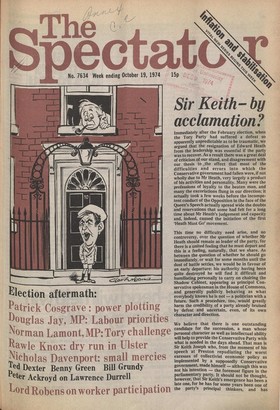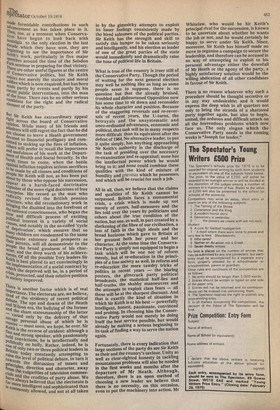Sir Keithby acclamation?
Immediately after the February election, when the Tory Party had suffered a defeat so apparently unpredictable as to be traumatic, we argued that the resignation of Edward Heath from the leadership was essential if the party was to recover. As a result there was a great deal of criticism of our stand, and disagreement with our thesis to the effect that most of the difficulties and errors into which the Conservative government had fallen were, if not wholly due to Mr Heath, very largely a product of his activities and personality. Many were the professions of loyalty to the beaten man, and many the excoriations flung in our direction; it actually took a few weeks before the incompetent conduct of the Opposition in the face of the Queen's Speech actually spread wide the doubts and reservations that some had felt for a long time about Mr Heath's judgement and capacity and, indeed, caused the initiation of the first 'Heath Must Go' movement.
This time no difficulty need arise, and no controversy, over the question of whether Mr Heath should remain as leader of the party, for there is a united feeling that he must depart and this is a feeling, naturally, that we share. As between the question of whether he should go immediately, or wait for some months until the dust of battle settles, we would be in favour of an early departure: his authority having been quite destroyed he will find it difficult and humiliating personally to carry on chairing the Shadow Cabinet, appearing as principal Conservative spokesman in the House of Commons, and generally publicly behaving as what everybody knows he is not — a politician with a future. Such a procedure, too, would greatly harm the credibility of a party already bruised by defeat and uncertain, even, of its own character and direction.
We believe that there is one outstanding candidate for the succession, a man whose personal character as well as intellectual ability will help to provide the Conservative Party with what is needed in the days ahead. That man is Sir Keith Joseph who, from the moment of his speech at Preston repudiating the worst excesses of collectivist economic policy as implemented by a supposedly Conservative government, made himself — although this was not his intention — the foremost figure in the parliamentary party. It should not be thought, however, that Sir Keith's emergence has been a late one, for he has for some years been one of the party's principal thinkers, and has made formidable contributions to such advancement as has taken place in it. 'Plea, too, at a moment when Conserva"yes have begun to look back with nostalgia to the only election in the last dbecade which they have won, they are eginaing to see the importance of Sir Reith's work, particularly in five major 8,Peeehes around the time of the Selsdon rark seminar in preparing for that victory. There are other useful figures at the centre °f Conservative politics, but Sir Keith ellinYs not merely the stature and moral calibre which is now required, but has been --e partly by events and partly by his recent public interventions, into the man °f the hour. There can be no other serious candidate for the right and the radical elenlent of the party.
tut sir Keith has extraordinary appeal 'int across the board of Conservative nion. While many of his friends and admirers will still regret the fact that he did 11.,°t choose to leave a Heath government uevoted to financial profligacy and comMitted to stoking up the fires of inflation' eathers will prefer to recall the importance ad usefulness of his work at the DepartMe 6-°of Health and Social Security. In the ,-11 times to come, when the battle i't,inst inflation requires serious sacrifices De made by all classes and conditions of 'Tonle Sir Keith will not, as has been put auout by those who oppose his succession, aliPear as a harsh-faced doctrinaire eexidoiter of the more rigid doctrines of free ,.„11.,terPrise. His record as the man who '''olcally revised the British pension bstructure, who did revolutionary work in the disabled into the forefront of e national consciousness, who began the and difficult process of exciting erwitical interest in a variety of social ises, and notably in the so-called 'cycle dePrivation', which ensures that so i."11,Y children are condemned to the same t"harquate existence and prospects as Zen' parents, will all demonstrate to the a'nPle the broad goodness of his char„!ter, and the deep worth of his achieve"lents. Rei Of all the possible Tory leaders Sir thet.h Is best placed to act convincingly in avIplementation of a social contract by ewhich the deprived will be, in a period of "sis, protected, and their relative position a society improved.
Ther • ie Is another factor which is of real tirl'artance. The electorate are, we believe, and e. the stridency of recent Political The ups and downs of the Heath and Wilson era, the bullying of the former and the sham statesmanship of the latter sa varied only by the delivery of that mvage personal abuse of which he is Ra-ter — must soon, we hope, be over. Sir fine elth is the reverse of strident: although a and strong speaker, with passionately held convictions, he is intellectually and 130°Iitically no bully. Rather, indeed, he is Bri.e Of only two or three political leaders in raise today today constantly attempting to wi ,_Ise the level of political debate, to turn it ...vards the discussion of issues and raeiples, direction and character, away c`r,oila the vulgarities of television commerg,T_Is and the crudities of party abuse. We rry e a 1Ways believed that the electorate is isq CO intelligent and sophisticated than "raMonly allowed, and not at all taken in by the gimmicky attempts to exploit its baser feelings consistently made by the hired salesmen of the political parties. Sir Keith has the strength and skill to satisfy this hunger to be taken seriously and intelligently, and his election as leader of one of the great parties of the state -would immediately and dramatically raise the tone of political life in Britain.
What is true of the country is truer still of the Conservative Party. Though the period of waiting for the next general election may well be nothing like as long as some people seem to suppose, there is no question but that the already bruised, troubled and disheartened Opposition now has some time to sit down and reconsider its whole character and position. Because of the staggering reversals and re-reversals of recent years, the U-turns, the betrayals and the unsystematic and unco-ordinated adventures, economic and political, that task will be in many respects more difficult than its equivalent after the defeat of 1964. No alternative leader, to put it quite simply, has anything approaching Sir Keith's authority in the discharge of the task of presiding over the necessary re-examination and re-appraisal; none has the intellectual power which he would bring to it; and none could combine these qualities with the kind of mixture of humility and gravitas which he possesses, and which will be crucial for such a job.
All in all, then, we believe that the claims and qualities of Sir Keith cannot be surpassed. Britain faces a monumental crisis, a crisis which is made up not merely of errors, half-measures and the lies told over the years by politicians and others about the true condition of the nation, but one, as well, in part created by a slackening of the fibre of our civilisation, a loss of faith in the high ideals and the broad horizons which gave to Britain at her greatest both her power and her character. At the same time the Conservative Party is simply not equipped to begin a task which will be one not of reform merely, but of re-education in the principles of a free society as well. In reform and re-education the more tawdry tricks of politics in recent years — the blaring posters, the gimcrack party political broadcasts, the statistical half-lies and half-truths, the shabby manoeuvres and the attempts to exploit class fears — all these will be at the sharpest discount. And that is exactly the kind of situation in which Sir Keith is at his best — powerfully intelligent, honest, passionate, convinced and probing. In choosing him the Conservative Party would not merely be doing itself the best service possible, but would already be making a serious beginning to its task of finding a way to serve the nation again.
Fortunately, there is every Indication that large sections of the party do see Sir Keith as their and the country's saviour. Unity as well as clear-sighted honesty in tackling mountainous problems will also be needed in the first weeks and months after the departure of Mr Heath. Although, therefore, there is an open method of choosing a new leader we believe that there is no necessity, on this occasion, even to put the machinery into action. Mr Whitelaw, who would be Sir Keith's principal rival for the succession, is known to be uncertain about whether he wants the job or not, and he would certainly be happy to serve under Sir Keith. Since, moreover, Sir Keith has himself made no move to organise a campaign to secure the leadership, and therefore can be accused in no way of attempting to exploit to his personal advantage either the downfall of Mr Heath or the agony of the party, a highly satisfactory solution would be the willing abdication of all other candidates in favour of Sir Keith.
There is no reason whatever why such a procedure should be thought secretive or in any way undesirable; and it would express the deep wish in all quarters not only to bring the strands of a shattered party together again, but also to begin, united, the arduous and difficult attack on all the horrendous problems which now face us. The only slogan which the Conservative Party needs in the coming weeks is "Joseph for leader."



































